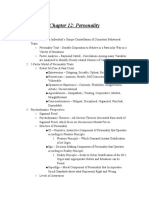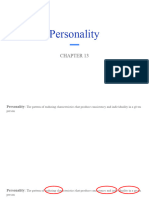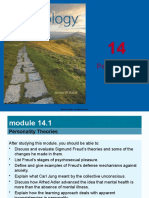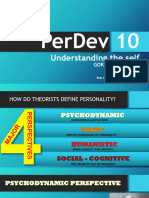Understanding Human
Personality
Asst. Prof. Gökçer Eskikurt
�• Psychological qualities that influence an individual’s characteristic
patterns of behavior across different situations and over time
• Theories two major goals
• Uniqueness
• Characteristic patterns of behavior
�Trait Personality Theories
• Trait
• Enduring qualities or attributes that predispose individuals to behave consistently
across situations
• Traits as predispositions vs descriptive dimensions
• Allport’s trait approach
• Building block of personality and source of individuality
• Traits produce coherence
• Intervening variables
• 3 kinds of traits
• Cardinal – person organizes his/her life
• Central – represent major characteristic of a person
• Secondary – specific personal features that help predict an individual’s behavior
• Personal structures are critical determiners than environmental conditions
��• Identifying universal trait
dimensions
• Raymond Cattell
• 16 factor source traits
• Hans Eysenck
• Three broad dimensions
• Extraversion (internally vs externally)
• Neuroticims (emotionally stable vs
emotionally unstable)
• Psychoticism (kind and considerate vs
aggressive and antisocial)
�• Five-factor Model (Big Five)
• Universal
• Brain functions
• Amygdala
• Level of extraversion
• Fearful, happy & neutral
�• Evalutionary perspectives on trait dimensions
• Social species
• who is good company (Extraversion)
• who is kind and supportive (Agreeableness)
• who puts in sustained effort (Conscientiousness)
• Who is emotionally undependable (Neuroticism)
• who has ideas that pan out (Openness [to experience])
�• Traits and heritability
• Behavioral genetics
• Monozygotic vs dizygotic
• Traits predict behaviors?
• Consistency paradox
• If…. then…. personality signatures
• If an individual brings a particular
disposition to a specific situation
then he or she will behave in a
particular way
• Kammrath et al .(2005)
• Jane
�Psychodynamic Theories
• Inner forces shape personality and motivate behavior
• Freudian Psychoanalysis
• All behavior was motivated
• Every action has a cause and purpose
• Drives and psychosexual development
• Psychic energy
• Two basic drives
• Self-preservation
• Eros
• Libido
• Fixation
��• Psychic Determinism
• Early conflicts help determine later behaviors
• Unconscious
• Latent content
• Neurotic symptoms, dreams and slip of the pen and tongue
• Freudian slip
• Structure of personality
• Id vs süperego, moderated by ego
• Id → pleasure principle
• Superego → conscience
• Ego → represents an individual’s personal view of physical and social reality, reality principle
�• Repression and ego defense
• Psychological process that protect an individual from experiencing extreme anxiety or
guilt about impulses, ideas, memory, etc.
• Defense mechanism are mental strategies the ego used to defend itself in the Daily
conflict between id and süperego
• Anxiety
�• Evaluation of Freudian Theory
• Vague and not operationally defined so diffucult to evaluate scientifically
• Good history but bad science
• Not predict what will occur, it applied retrospectively
• Directs attention away from the current stimuli
• Three criticism
• Developmental theory but no child observation
• Minimizes traumatic experiences to fantasies
• Androcentric
�Extending Psychodynamic Theories
• They put greater emphasis on ego functions, including ego defenses,
development of the self, conscious thought processes, and personal
mastery
• They view social variables (culture, family, and peers) as playing a
greater role in shaping personality
• They put less emphasis on the importance of general sexual urges, or
libidinal energy
• They extended personality development beyond childhood to include
the entire life span
�• Alfred Adler
• Reject Eros and pleasure principle
• Inferiority – peopleattempt to superior
• Karen Horney
• Womb envy
• Cultural factors
• Carl Jung
• Unconscios
• Collective unconscious
• Archetype
• Primitve symbolic representation of a particular experience or object
• Analytic psychology
• Internal forces in dynamic balance
• Reject libido
• Need to create
• Need to become coherent
�Humanistic Theories
• Features of humanistic theories
• Carl Rogers
• Self-concept
• Unconditional positive regard in raising children
• Abraham Maslow
• Self-actualization
• Karen Horney
• Real self
• Humanistic theories are
• Holistic – explain seperate acts in terms of entire personalities
• Dispositional – focus on innate qualities. Situational factors as seen as constraints and barriers
• Phenomenological – emphasize an individual’s frame of reference and subjective view of
reality
�• Evaluation of humanistic theories
• What is self-actualization? Inborn tendency or cultural context.
• Neglect the important environmental variables that influences behavior
• Narrative identities or life stories
• Psychobiography
�Social-Learning and Cognitive Theories
• Solid link between personality and particular behaviors?
• Reinforcement history
• Rotter’s Expectancy Theory
• Reward value
• Locus of control
• Internals
• Externals
• Mischel’s cognitive-affective personality theory
• Environment interaction and cognitive organization
��• Bandura’s Cognitive Social-learning theory
• Not driven by inner forces nor helpless pawns of
environmental influence
• Cognitive processes that are involved in acquiring and
maintaining patterns of behavior
• Complex interaction among individual factors, behavior,
environmental stimuli
• Reciprocal
• Observational learning
• Self-efficacy
• The belief that one can perform adequately in a particular
situation
• Vicarious experience
• Persuasion
• Monitoing of your emotional arousal as you think about or
approach a task
�• Evaluation of social-learning ad cognitive theories
• Emotion is not important component of personality
• Products of thoughts and behavior
• Not recognizing the impact of unconsvious motivation on behavior and affect
• Little say about the developmental origins of adult personality
�Self Theories
• William James
• 3 components
• Material me,
• Social me
• Spiritual me
• Self-concepts
• Dynamic mental structure that motivates, interprets, organizes, mediates, and
regulates intrapersonal and interpersonal behaviors and processes
• Self-schemas
• Self-esteem
• Generalized evaluation of the self
• Genetic, enviromental factors, people’s perceptions of their ability
�• Self-enhancement
• People take steps to view their own actions and behaviors as consistently positive
• Self-handicapping
• When people doubt their ability to perform a task they have a ready-made excuse for
failure that does not imply lack of ability
• Terror management theory
• Self-esteem helps people cope with the inevitability of death
• Symbolic immortality
�• Cultural construction of self
• Individualistic cultures encourage independent
construals of self
• Collectivist cultures encourage interdependent
construals of self
• Twenty statement test (TST)
• US men and women 64% and 65%
• Indian men and women 35% and 33%
• Western culture affect
• No exposure western culture moved Nairubi 82% social
responses
• Workers in Nairobi 58% social responses
• Students at the University of Nairobi 17% social
responses
�• Evaluation of Self theories
• Self theories succeed at capturing people’s own concepts of their
personalities and the way they wish to be perceived by others.
• Examinations of cross-cultural construals of the self have had great influence
• Critics: approaches to personality argue against their limitless boundaries
• Genetic
�Assessing Personality
• Objective tests
• The MMPI (Minnesota
Mulitphasic Personality
Inventory(R)-2)
• The NEO-PI
• Projective tests
• The Rorschach
• The TAT
























































































